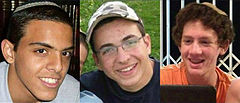B“H
On June 12, 2014, three Israeli teenagers were kidnapped at the bus/hitchhiking
stop at the Israeli settlement of Alon Shvut northeast of Kfar Etzion in the West
Bank, as they were hitchhiking to their homes. The three teens were Naftali
Fraenkel, Gilad Shaer, and Eyal Yifrah.
My wife and I were vacationing in Amsterdam at the time of their abduction. The
local Jewish community was devastated and in shock. Everyone was sincerely
concerned for the boys and their family's well-being.
A special community prayer was quickly organized at the local shul, to do their
part in helping bring the poor boys home.
The shul was jam-packed with Jews
from all backgrounds praying together and begging the heavens for a miracle.
There were the locals and quite a few visitors vacationing from all over the world.
Tears were flowing as the sobbing prayers grew louder and louder. It was a very
emotionally moving communal event even amongst people that had never met
before in their lives, yet at that moment it felt like we were one big family.
When we returned home to Israel after our trip, we noticed that the only thing
predominantly on people's minds wherever we went, was that everyone was
yearning to hear good news. For many weeks worldwide prayers were held
throughout the Jewish world begging for mercy from up higher up.
On June 30, 2014 search teams found the bodies of the three missing teenagers in a
field northwest of Chevron. They had apparently been shot to death shortly after
their abduction.
My wife and I decided to pay a visit to the families that were sitting shivah ( a
period of seven days’ formal mourning for the dead, beginning immediately after
the funeral.) Even though we did not personally know them we felt that it was the
least we can do to help console the families. People waiting in line for the Fraenkel
house were wrapped all around the house and all the way down the block. It was
noted that thousands of Jews from all over Israel felt the same way as we did.
This week's Parsha, Ki Savo. Moshe tells the Jewish people that they are about to
enter the land of Israel. They will fight wars and conquer their enemies. The land
will be divided up amongst the tribes of Israel. You will work your fields and plant
your orchards and when you have your first fruits you should bring them up as an
offering of gratitude to Hashem.
Our sages explain something quite amazing, that the lands were conquered in
stages and when a tribe's land was conquered their families were allowed to settle
in their land and start working their fields. However, even though the first families
might of had their first fruits rather quickly they could not offer the offering of the
first fruits until all the tribes had conquered their respective lands.
The reason is that this offering has to be given with a feeling of complete
happiness. It cannot be that a Jew will have complete happiness when he knows
that other Jews have yet to receive their land and first fruits.
Chasidus tells a story of a Rabbi that told his students that he met the prophet,
Elijah in a dream.
He went on to tell them that in his dream he asked Elijah to please bring the
Mashiach already. The Messiah in Judaism is a savior and liberator figure in
Jewish eschatology, who is believed to be the future redeemer of the Jewish people.
Elijah responded I can bring him now however if I do a few Jewish souls will
never be fully repaired. So the Rabbi told Elijah in that case then wait until the
process is completed.
One of the suffering students popped out of his seat and asked the Rabbi but why
since there is so much pain and suffering, so what if a few souls don’t make it?
TheRabbi looked him squarely in the eyes and said because my son if you think that
way then you are clearly one of them.
The Chasam Sofer signifies that the main prayers on Rosh Hashanah should be
focused on praying for the good of the entire nation. One should not focus on
yourself at all, for as a united group we are blessed with all of the goodness and are
spared any harsh judgment. (Chasam Sofer was one of the leading Orthodox rabbis
of European Jewry in the first half of the nineteenth century.)When we focus our
prayers on our own personal needs, we leave the protective merciful cloud
hovering over Klal Yisrael (signifying a sense of community amongst the world
Jewry) and to make ourselves vulnerable to harsh judgment would be a Heavenly
offense.
Have a wonderful Shabbos.
Yitzchok Friedman

